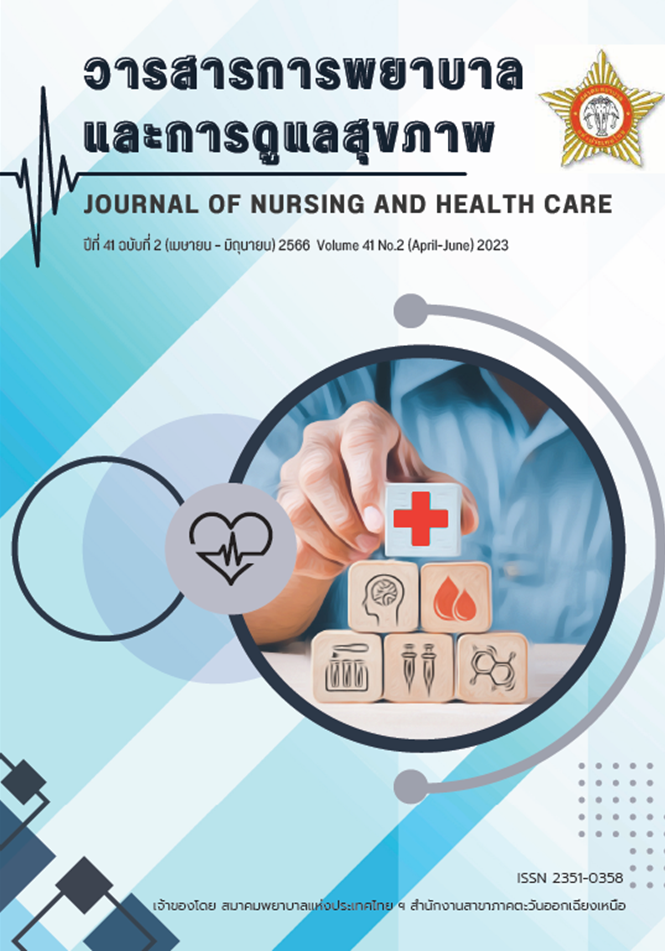การพัฒนาโปรแกรมการเสริมสร้างศักยภาพการดูแลตนเองของผู้ป่วยจิตเภทที่มีอาการด้านบวก
คำสำคัญ:
โปรแกรมเสริมสร้างศักยภาพ, การดูแลตนเอง, ผู้ป่วยจิตเภทที่มีอาการด้านบวกบทคัดย่อ
การวิจัยและพัฒนานี้ มีวัตถุประสงค์เพื่อพัฒนาโปรแกรมการสริมสร้างศักยภาพการดูแลตนเองของผู้ป่วยจิตเภทที่มีอาการด้านบวก และศึกษาประสิทธิผลของโปรแกรมการเสริมสร้างศักยภาพการดูแลตนเองของผู้ป่วยจิตเภทที่มีอาการด้านบวก วิธีดำเนินการวิจัยประกอบด้วย 4 ขั้นตอน คือ 1) การวิเคราะห์สภาพปัญหา 2) การออกแบบและพัฒนา 3) การทดลองใช้ 4) การประเมินผล กลุ่มตัวอย่างเป็นผู้ป่วยจิตเภทที่มีอาการด้านบวก เป็นกลุ่มทดลองและกลุ่มเปรียบเทียบ กลุ่มละ 25 คน เก็บรวบรวมข้อมูลโดยการสัมภาษณ์และตอบแบบสอบถาม เครื่องมือที่ใช้ในการรวบรวมข้อมูล ได้แก่ แบบสอบถามความสามารถการดูแลตนเองของผู้ป่วยจิตเภทที่มีอาการด้านบวก ตรวจสอบค่าความเชื่อมั่นโดยใช้สัมประสิทธิ์แอลฟาของครอนบาคได้เท่ากับ 0.95 วิเคราะห์ข้อมูล โดยการวิเคราะห์สรุปเนื้อหา และสถิติ ร้อยละ ค่าเฉลี่ย ส่วนเบี่ยงเบนมาตรฐาน และการทดสอบที
ผลการวิจัยพบว่า 1. โปรแกรมฯ ที่พัฒนาประกอบด้วย 6 กิจกรรม ได้แก่ 1) การเจ็บป่วยและการดูแลตนเอง 2) ประเมินการรับรู้ศักยภาพการอยู่กับอาการด้านบวกที่หลงเหลือ 3) ความเชื่อมั่นในการดูแลตนเอง:ด้านกิจวัตรพื้นฐาน 4) เป้าหมายและสร้างความเชื่อมั่นในการสื่อสาร 5) เป้าหมายดูแลตนเองเรื่องอาการ การรับประทานอาหารและยา 6) เสริมแรงและสรุป มีค่าความสอดคล้องระหว่างกิจกรรมและแนวคิดที่ใช้เท่ากับ .89 2. ค่าเฉลี่ยคะแนนความสามารถในการดูแลตนเองของกลุ่มทดลองเพิ่มขึ้นมากกว่ากลุ่มเปรียบเทียบ หลังทดลอง และติดตามหลังทดลอง 1 เดือน อย่างมีนัยสำคัญทางสถิติโปรแกรมนี้สามารถนำไปใช้ดูแลผู้ป่วยจิตเภทที่มีอาการด้านบวกและผู้ป่วยอื่น ๆ ที่มีปัญหาคล้ายกันได้
Downloads
เอกสารอ้างอิง
Lotrakol M, Sukanich P. Psychiatric Ramathibody.4th ed. Bangkok: Beyon enterprise; 2015. (in Thai)
Sadock B, Sandock VA, Kaplan. Sadoc’ s synopsis of psychiatry: Behavioral science/clinical psychiatry.5th ed. Philadelphia: Lippincott Willams & Wilkins; 2003.
Sirithemanan P, Seeherunwong A, Pomchaikate AY. Cognitive behavior therapy for reducing positive symptoms in patients with schizophrenia: Reviews for evidences-based practice,J psychiatr assoc Thailand. 2012;57(2):235-48. (in Thai)
Lotrakul M, Sukanit P. Psychiatry Ramathibody. Bangkok: Chonpimprinting; 1999. (in Thai)
Lotrakol M, Sukanich P.Psychiatric Ramathibody. Bangkok: Beyon enterprise; 2012. (in Thai)
Lewis S, Tarrier N, Haddock G, Bentall R, Kinderman P, Kingdon D, et al. Randonmized controlled trial of cognitive behavioral therapy in early schizophrenia: acute phase outcomes.BJ Psych 2002;181:91-7.
Simavarongkul C. Positive psychology intervention in patients with schizophrenia. Journal of Humanities and social Sciences Valaya Alongkorn 2020;15(1):44-58. (in Thai)
Thongsai S. Sustanable care for patients with schizophrenia in the context of Thai society. Journal of Nursing Division. 2015;42(3):159-65. (in Thai)
Kocal Y, Karakus G, Taman L, Kocaly, Karakus G, Taman L. Sociodemographic and clinical characteristic of inpatients with schizophrenia in paychiatric clinic. J Clin Psy [internet]. 2017 [cited 2021 Jan 20]. Available from: klinikpsikiyatri. org/eng/jvi.aspx
Srithanya statistics. Patients Statistics Reports. Nonthaburi; 2021. (in Thai)
Bundasak T. The role of nurses in caring patients with schizophrenia.Rtamej. 2021;74(3):221-32. (in Thai)
Aumlum T, Preechawong S, Upasen R. The effect of symptom management programs with family involvement on positive symptoms of person with schizophrenia in community. The Journal of Psychiatric Nursing and Mental Health. 2019;33(3):56-67. (in Thai)
Black DW, Anderson NC. Introductory textbook of psychiatry.5th ed Washington DC. American psychiatric publishing; 2011.
Wondrajit K, Boonyamalik P, Suksawang S, Sawangwongsin S. Assessment form for rehabilitation of psychiatric patients in communities. Bangkok: Agriculturral Cooperation Community printinghouse of Thailand; 2017. (in Thai)
Orem DE. Nursing : concept of practice.6th ed. St.Louis Mo: Mosby; 2001.
Bandura A. Social learning Theory. Newjersey: Practice-Hall; 1997.
Degkong T, Patamin A, Kaeomueang T, Ruthatip A. Guildines for the care and treatment of people suffering from alcohol problems. Bangkok : Bureau of Mental Health : Department of Mental Health; 2004. (in Thai)
Faul F, Erdfelder E, Lang AG, Buchner A, G* Power3:A flexible statistical power analysis program for the social,behavior and biochemical science.Behavior Research Methods 2007;39:175-91.
Wijitphanya A, Pholdechasawat S, Suntarowit N. The Illness self-management program for patient’s self-care ability research and development. The Journal of Psychiatric Nursing and Mental Health. 2018;32(1):86-101. (in Thai)
Grove SK, Burns N, Gray JR. The practice of nursing research: Appraisal synthesis and generation of evidence. 7th ed .St.Louise,MO:Saunders Elsevier; 2013.
Kumlungmak W. Dangdomyouth P. The effect of group stress management on positive symptoms of schizophrenic patients. The Journal of Psychiatric Nursing and Mental Health. 2020;34(3):102-17. (in Thai)
Setthajan N, Sangoumpak O, Yoomuenbay S, Jinaklung W. The development of perceived self-efficacy program to health behaviors in schizophrenia patients. The Journal of Psychiatric Nursing and Mental Health. 2016;30(1):1-16. (in Thai)
Modekasem W, Dangdomyouth P. The effect of resilience enhancement group program on depression of schizophrenia patients. Journal of The Royal Thai Army Nurses. 2022;23(3):248-56. (in Thai)
ดาวน์โหลด
เผยแพร่แล้ว
รูปแบบการอ้างอิง
ฉบับ
ประเภทบทความ
สัญญาอนุญาต
ลิขสิทธิ์ (c) 2023 วารสารการพยาบาลและการดูแลสุขภาพ

อนุญาตภายใต้เงื่อนไข Creative Commons Attribution-NonCommercial-NoDerivatives 4.0 International License.



